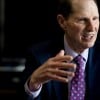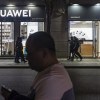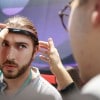Analysis | The Technology 202: Facial recognition gets another look on Capitol Hill today from skeptical lawmakers – The Washington Post

House Oversight and Reform Committee ranking member Jim Jordan (R-OH) (L) greets Chair Carolyn Maloney (D-NY). (Photo by Chip Somodevilla/Getty Images)
Ctrl + N
A congressional facial recognition hearing slated for today could revive bipartisan momentum on Capitol Hill for regulation of the nascent software being rolled out from law enforcement agencies to summer camps.
Expect a skeptical tone today as the House Oversight and Reform Committee convenes this morning for its third hearing on the topic, following months of delays related to impeachment and the death of former committee chair Elijah Cummings (D-Md.). Lawmakers have learned more about the dark side and risks of facial recognition in the seven months since the committee last held a hearing on the artificial intelligence software.
“It is clear that, despite the private sector’s expanded use of the technology, it is just not ready for prime time,” House Oversight Chairwoman Carolyn Maloney (D-N.Y.) will say, according to opening remarks shared with The Technology 202.
Since then, there’s been a steady drumbeat of reports raising questions about the accuracy and efficacy of facial recognition algorithms. Just this week: A group seeking to ban facial recognition technology in Denver found it falsely matched Denver City Council members to people in the sex offender registry, in some instances with a confidence rating of 92 percent. And a New York Times review of hundreds of Florida police cases exposed that the software falls short in cases with grainy surveillance footage, and there’s little oversight of how the police are using it. Its role in legal cases is not always disclosed to defendants.
Facial recognition has emerged as a rare issue in Washington that unites Republicans and Democrats, as lawmakers from both parties have condemned the new technology as a potential threat to privacy and civil liberties. A recent flurry of efforts to restrict the software’s use at the city and state level could put greater pressure on Washington to consider federal regulations.
“The technology is being used in schools, grocery stores, airports, malls, theme parks, stadiums, and on our phones, social media platforms, doorbell camera footage, and even in hiring decision,” Maloney said. “This technology is completely unregulated at the federal level, resulting in some questionable and even dangerous applications.”
Lawmakers are expected to discuss possible legislative solutions after a flurry of proposals introduced last year to rein in the software’s use. Cummings last summer was reportedly working with Rep. Jim Jordan (Ohio), the committee’s top Republican, to introduce bipartisan legislation limiting funding for federal agencies to buy new facial recognition technology. Maloney told Politico in December that no bill text was written and the committee had to study the facts before moving forward.
Lawmakers will today hear a wide range of perspectives on how they should regulate the software, as the witness list includes privacy and artificial ethics advocates including Brenda Leong, Future of Privacy Forum senior counsel; and Meredith Whittaker, the AI Now Institute co-founder. Industry representatives will also be on deck, with testimony from Daniel Castro, vice president of the Information Technology and Innovation Foundation; and Jake Parker, the Security Industry Association director of government relations.
Expect a divided group: Whittaker will call for policymakers and businesses to halt all use of facial recognition in sensitive social situations and political contexts, according to a press release. But Castro will warn Congress to avoid bans on the technology and instead consider steps to improve oversight and accountability.
“Recent calls for bans or moratoriums on facial recognition are misguided and would have negative economic and social consequences,” he will say. “Even narrow bans can have unintended consequences, given the widespread integration of facial recognition technology in many products and services.”
The committee is also expected to discuss a December National Institute of Standards Technology study, which found that facial recognition algorithms had higher rates of false positives for people of color relative to white faces. The landmark study found Asian and African Americans were up to 100 times more likely to be misidentified than white men, depending on the particular algorithm and type of search. Charles Romine, NIST’s Information Technology Laboratory director, is also a witness.
BITS, NIBBLES AND BYTES

Apple CEO Tim Cook and President Trump speak during a tour of an Apple manufacturing plant in November in Austin. (Evan Vucci/AP)
BITS: President Trump attacked Apple on Twitter yesterday for refusing to help law enforcement “unlock phones used by killers, drug dealers and other violent criminal elements.” The presidential condemnation comes as Attorney General William P. Barr is pressuring the company to help the FBI crack into two encrypted iPhones belonging to a gunman who killed three people at a Florida military base last month.
“We are helping Apple all of the time on TRADE and so many other issues, and yet they refuse to unlock phones used by killers, drug dealers and other violent criminal elements. They will have to step up to the plate and help our great Country, NOW! MAKE AMERICA GREAT AGAIN,” Trump tweeted.
What’s at stake is a do-over of the 2016 legal battle during which the FBI asked a court to force Apple help it crack into an iPhone used by the San Bernardino, Calif., shooter Syed Farook. It withdrew the request before a judge’s ruling. At the time, Trump urged a boycott of Apple.
CEO Tim Cook has already called on the company’s top advisers to prepare for a new legal battle, Jack Nicas and Katie Benner at the New York Times report. Apple insists that it has cooperated with the investigation and maintains that weakening encryption for law enforcement could be exploited by bad actors.
The tweet marks a new turn in the tempestuous relationship between the tech giant and the White House. In November, Trump praised Apple for its Texas manufacturing plant and Tim Cook has served on the White House workforce advisory board.

Democratic presidential candidate Sen. Elizabeth Warren (Mass.). (Patrick Semansky/AP)
NIBBLES: Antitrust alone won’t be enough to fix Big Tech, Democratic presidential candidate Elizabeth Warren said in a recent interview with the New York Times’s Charlie Warzel.
“I don’t believe that markets alone are going to fix all the problems we’re facing on the tech side,” she told Charlie. “Particularly the issues around privacy and the values that come from aggregation on platforms and how that value would be distributed.”
“I don’t believe only antitrust works, but I do believe it’s a powerful tool we should be using in dealing with Big Tech,” she added, responding to criticism from opponent Andrew Yang that her proposal was “outdated.”
Warren also spoke to her personal relationship with technology, saying that she was worried about privacy most when sending Snapchat messages to her granddaughters and texting with her family.
“Who’s watching and for what purposes? What kind of information are they scraping off and to use in what ways? It’s wrong. We need to put a stop to it,” she said.

The Grindr app. (Hassan Ammar/AP)
BYTES: Popular dating apps including Grindr, Tinder and OkCupid are sharing personal user data such as sexual preference and location to advertisers in a possible violation of privacy laws in California and Europe, Natasha Singer and Aaron Krolik at the New York Times report.
The findings come from a new report from the Norwegian Consumer Council, a nonprofit organization that recently filed three complaints against Grindr under the European Union’s General Data Protection Regulation law.
“Any consumer with an average number of apps on their phone — anywhere between 40 and 80 apps — will have their data shared with hundreds or perhaps thousands of actors online,” said Finn Myrstad, the digital policy director for the Norwegian Consumer Council.
American consumer groups are calling on regulators including the attorney general of California to investigate whether Grindr and the other apps called out in the report could be in violation of federal and state laws as well, Natasha and Aaron report. Twitter suspended Grindr yesterday after the report revealed the company was sharing private user data with the social media platform’s ad network.
Grindr told the Times it had not received a copy of the report and could not comment specifically on the content.
PUBLIC CLOUD
— A bipartisan group of senators led by Intelligence Committee Chairman Richard Burr (R-N.C.) and ranking Democrat Mark Warner (Va.) introduced legislation yesterday that would deliver more than $1 billion to help develop and fund alternative next-generation 5G wireless technology to compete with China’s Huawei and ZTE. Lawmakers and U.S. government officials have charged those companies are too beholden to the Chinese government and could be complicit in Beijing spying.
“The widespread adoption of 5G has the potential to transform the way we do business, but also carries significant national security risks,” Burr said in a statement. “Those risks could prove disastrous if Huawei, a company that operates at the behest of the Chinese government, military, and intelligence services, is allowed to take over the 5G market unchecked.”
— More news from the public sector:
Sen. Ron Wyden calls for an investigation of the ad-blocking industry
Google and Amazon were caught paying to be whitelisted.
The Verge
Despite Election Security Fears, Iowa Caucuses Will Use New Smartphone App
The Iowa Democratic Party confirmed to Iowa Public Radio and NPR that it plans to use an Internet-based app to transmit results, but it declined to provide any more specifics or security details.
NPR
Tech Tensions Simmer in Washington as U.S., China Near Trade Truce
While the U.S. and China are set to sign an initial trade pact this week, White House and congressional policy makers disagree over technology issues relating to Beijing and telecom giant Huawei.
The Wall Street Journal
PRIVATE CLOUD
— News from the private sector:
Cookies track you across the internet. Google wants to phase them out.
The move is meant to offer users greater control over their digital footprints and enhance user privacy, but critics worry it further entrenches Google’s dominance.
NBC News
As Justice Department Pressures Apple, Investigators Say iPhone Easier to Crack
The escalation of a long-running encryption conflict between the Justice Department and Apple has puzzled security experts who say that new hacking tools have made it possible to gain access to many of the company’s devices in criminal investigations.
Wall Street Journal
Google just bought a startup that will help it list physical stores’ products online
Dublin-based startup Pointy joins Google
The Verge
#TRENDING
— Tech news generating buzz around the Web:
Gadgets for Life on a Miserable Planet
At the Consumer Electronics Show, the only solution for technology-induced stress is more technology.
The Atlantic
Students Are Campaigning to Ban Facial Recognition From College Campuses
A new national campaign wants to stop facial recognition from invading U.S. college campuses.
Vice
Technology Can’t Fix Algorithmic Injustice
We need greater democratic oversight of AI not just from developers and designers, but from all members of society.
Boston Review
Missing ‘Friends’ on Netflix? Find a DVD Player.
Netflix lost the ’90s hit in the streaming wars. It won’t reappear on HBO Max until May. In the meantime, fans unearth old tech and hack European feeds.
The Wall Street Journal
@MENTIONS
- Michael O’Leary is joining the Entertainment Software Association as its new Senior Vice President of Government Affairs.
- Jessica González will assume the role of co-CEO of Free Press and Free Press Action alongside Co-CEO Craig Aaron, who has served since 2011 as the organizations’ sole CEO. González previously served at Free Press and Free Press Action as VP of Strategy and Senior Counsel.
CHECK-INS
— Today:
- The House Oversight Committee will hold a hearing called “Facial Recognition Technology (Part III): Ensuring Commercial Transparency & Accuracy” at 10am.
— Coming up:
- The House Antitrust Subcommittee will host a field hearing on the role of competitors in the digital economy at 10 a.m. on Friday at the University of Colorado Law School in Boulder.
- Silicon Flatirons will host its “Technology Optimism and Pessimism” conference Feb. 9 and 10 at the University of Colorado Law School in Boulder, Colorado. Speakers include FCC Michael O’Rielly and FTC Commissioner Rohit Chopra.
- Mobile World Congress takes place Feb. 24 to 27 in Barcelona
















